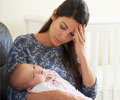All women should be asked about the risk factors that lead to postpartum psychosis to help early recognition and treatment, a new review claims

Common symptoms include; mania, severe depression, delusions and hallucinations, confusion, bewilderment or perplexity, all of which increase the risk for both mother and child.
The review notes that there is consistent evidence of a specific relationship between postpartum psychosis and bipolar disorder. Women with bipolar disorder have at least a 1 in 4 risk of suffering postpartum psychosis. Genetics are also a factor and women with bipolar disorder and a personal or family history of postpartum psychosis are at particularly high risk with greater than 1 in 2 deliveries affected by postpartum psychosis.
However, half of women who develop postpartum psychosis have no family history or previous risk factors that put them in a high risk group of suffering from the condition.
The review emphasises the need for close contact and review from a multidisciplinary team during the perinatal period for at least three months following delivery, even if the woman is well and recommends a written plan covering pregnancy and the postnatal period which should be discussed with the woman and her family.
Dr Ian Jones, Reader in Perinatal Psychiatry, Cardiff University and co-author of the review said:
Advertisement
"Postpartum psychosis is a true psychiatric emergency and it is vital that is recognised early and treated immediately. Admission to hospital is usually necessary and women should ideally be offered a specialist mother and baby unit where the best treatment options can be established."
Advertisement
"This review emphasises the importance of women at high risk of postpartum psychosis as well as the early recognition and prompt treatment of women who develop the condition."
"This paper also underlines that half of women who experience postpartum psychosis have no previous risk factors. It is therefore vital that all women are made aware of the condition and its signs and symptoms."
Source-Eurekalert








